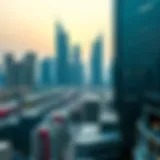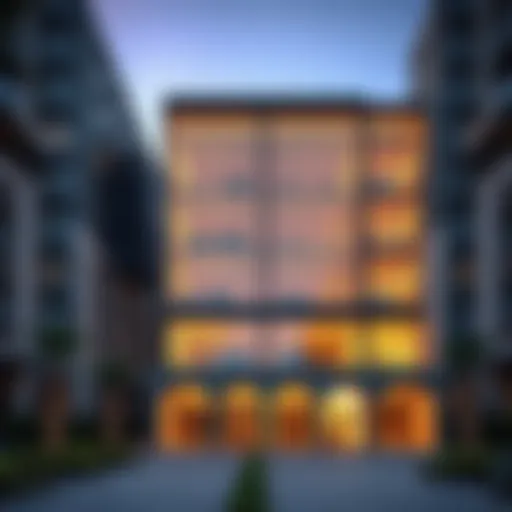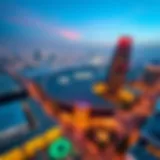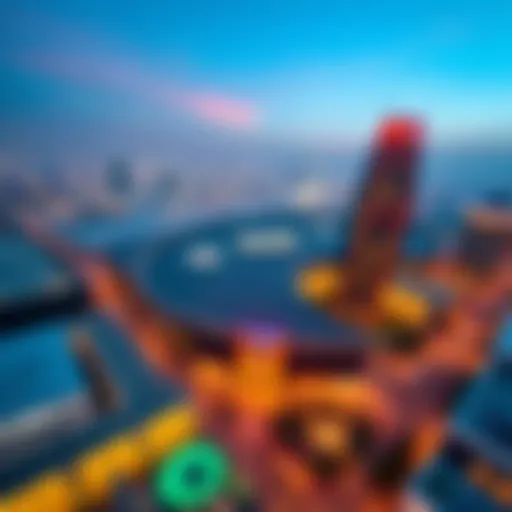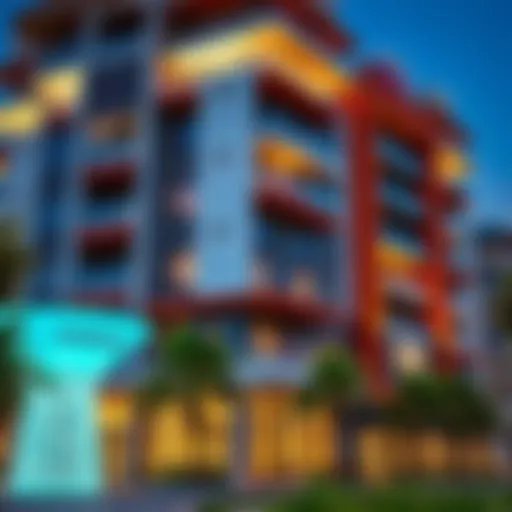Arabian Escapes: Discover the Allure of the Middle East
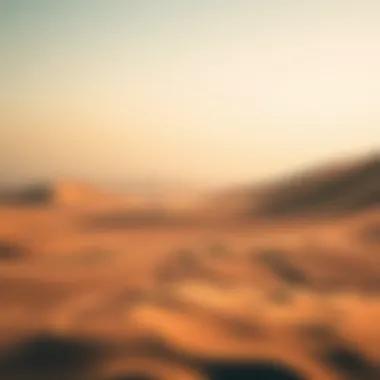

Intro
The Middle East, a region often shrouded in mystery and misunderstanding, offers much more than what meets the eye. From the sand-swept deserts to the shimmering skylines of urban areas, this land is a cradle of cultures, histories, and landscapes that defy singular definition. As we dive into the myriad facets of Arabian escapes, it becomes evident that travel within these locales is not solely about leisure but embodies opportunities for investment, exploration, and a deep appreciation for a rich heritage.
In recent years, global interest in the Middle East has surged, with investors and travelers alike turning their gaze toward this vibrant area. But it’s not just about visiting and appreciating the intrinsic beauty; it’s about understanding the dynamics at play that make this region uniquely appealing. Each distinct country offers an intriguing blend of tradition and modernity, with a cultural richness that resonates with people from all walks of life.
One cannot ignore the intricate tapestry of real estate in the Middle East, particularly in hotspots like Dubai and Abu Dhabi. Property values are surging, fueled by both affluent buyers looking for luxury homes and investors enticing themselves with high returns on investment. Thus, a closer look into current market trends unveils a wealth of possibilities for savvy investors and prospective homeowners.
Market Trends
Current Real Estate Landscape
The real estate market in the Middle East is a vivid reflection of its multifaceted nature. In cities like Dubai, modern architecture collides with the historic charm of the old souks, creating a unique sense of place. The market here is extremely competitive, with developers continuously innovating to stay ahead. Residential projects are often designed not only for aesthetic appeal but also for sustainability, reflecting evolving consumer preferences.
Property Price Trends
Understanding property price trends is essential for anyone looking to invest in the region. Prices have shown a roller-coaster pattern; however, current trends indicate a gradual stabilization. Areas previously deemed out of reach, such as Dubai Marina or Palm Jumeirah, may still hold potential for investment as they continue to develop luxury offerings.
- Analyzing pricing shifts: It’s important to monitor fluctuations, which can often signal broader economic trends.
- Luxury segment attraction: There's an undeniable allure surrounding high-end properties, making them sought-after even during slower economic phases.
According to data from https://www.britannica.com, Dubai consistently ranks as a global city of influence, drawing in investments across sectors.
Understanding Arabian Escapes
Arabian escapes invite both wanderlust and a thirst for knowledge, as the Middle East offers a captivating blend of history, culture, and adventure that cannot be merely skimmed over. The significance of understanding this concept lies in its potential to enhance travel experiences and investment strategies in the region. By grasping this multifaceted notion, individuals can better navigate the cultural labyrinth of customs, social norms, and the contrasting realities of daily life here.
Defining the Concept
Arabian escapes can be defined as immersive experiences that allow travelers to engage deeply with the essence of Middle Eastern culture and landscapes. These escapes emphasize a connection to the land, its peoples, and its storied past, avoiding mere tourist snapshots. For example, when visiting places like Petra in Jordan or the souks of Marrakech, the true escape comes not just from the stunning visuals but also from the stories behind these places, the craftspeople's work, and the traditions that breathe life into them. Through this depth of engagement, one uncovers layers of meaning that transform an ordinary trip into a lasting memory.
Geographical Diversity
The Middle East boasts remarkable geographical diversity, with its landscapes ranging from arid deserts to vibrant coastlines and breathtaking mountain ranges. Each region plays a unique role in shaping local cultures and lifestyles. For instance, in the coastal city of Dubai, the pristine beaches contrast sharply with the rolling dunes of the Arabian desert just a short drive away.
Furthermore, the geographical features influence economic opportunities, tourism potential, and even social customs. Highlighting a journey across this varied landscape can lead to encounters with nature,adventure sports, or simply meditative retreats in remote oases. Consider visiting the lush, green hills of Lebanon's Bekaa Valley or the stark beauty of the Empty Quarter in Saudi Arabia; both present rich opportunities to witness nature's splendor.
Cultural Richness
A vital aspect of Arabian escapes is the cultural richness that permeates every corner of the region. Cities like Istanbul, Cairo, and Muscat, for example, pulsate with vibrant arts, history, and culinary delights. Every culture has its own distinct heritage, reflected in local festivals, music, and art forms. Travelers can partake in the exhilarating experience of savoring traditional dishes like falafel or shawarma, where every bite tells a story.
Moreover, the tapestry of cultures in the Middle East is woven from various threads — from ancient civilizations to modern influences, creating a unique blend that keeps evolving. Whether one is drawn to the intricate patterns of Islamic art or the rhythmic beats of a local band, the invitation to explore is enticing.
"The Middle East is a place where history breathes; every stone and story holds the essence of its past."
In summation, understanding Arabian escapes provides a fundamental framework for anyone looking to explore this vibrant region. By defining the concept, appreciating its geographical diversity, and diving into cultural richness, the journey not only enhances the travel experience but also encourages a meaningful connection with a land that has shaped human civilization for millennia.
For further insights on territorial and cultural aspects, see Wikipedia and Britannica for a comprehensive overview.
Historical Context of Arabian Escapes
Understanding history sets the stage for all that unfolds in the Middle East today. The rich historical tapestry of Arabian escapes speaks volumes about its diverse societies and the evolution of its landscapes. By exploring the historical context, we grasp the significance of the region not just as a travel destination but as a cradle of civilization where ancient cultures thrived, colonial powers made their mark, and modern developments reshape the way the world sees the Middle East.
Ancient Civilizations
When we talk about ancient civilizations in the Middle East, a few names undoubtedly come to mind—Mesopotamia, the cradle of civilization, is often highlighted. This region was home to the Sumerians, Akkadians, Babylonians, and Assyrians who laid down the foundations of urban living, agriculture, and governance. Observing the ruins of ancient Babylon or standing next to the ziggurats of Ur gives a tangible connection to a past when these cities flourished.
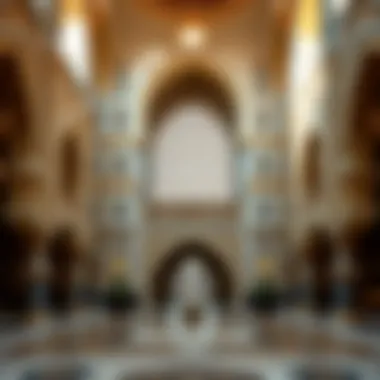

Moreover, these ancient cultures introduced innovations—writing systems like cuneiform, mathematical principles, and even some of the earliest legal codes. Typical evidence of their advanced society can still be seen today in art, literature, and remnants of architectural grandeur, which beckon explorers and historians alike. These ancient threads form the basis of social customs that endure in modern times, making these experiences more than mere tourism.
Colonial Influences
Fast forward to the 19th and 20th centuries, the Middle East found itself woven into the fabric of colonial ambition. Powers such as Britain and France sought control over this strategically significant region, sparking conflict and, often, upheaval. The Sykes-Picot Agreement, a clandestine deal, divided the Ottoman territories among European powers, leading to borders that still affect geopolitics today.
The colonial period has left a dual legacy—while it imposed foreign governance, it also facilitated infrastructural development, which sparked new urban centers. Cities like Dubai transformed from simple fishing villages into bustling metropolises due, in part, to various colonial enterprises. Understanding this context allows today's visitors to appreciate the complex layers of modern Arab identity, shaped by both indigenous cultures and external influences.
Modern Developments
In recent decades, the Middle East has been synonymous with rapid modernization. Countries such as the United Arab Emirates and Qatar have rapidly commercialized their economies by tapping into the oil wealth. Cities like Abu Dhabi and Riyadh have created landmarks that mirror global architectural trends.
However, modernization doesn't come without its challenges. Migration, urbanization, and globalization bring diverse cultures into a melting pot, complicating social dynamics. Possible discord between traditional values and modern lifestyles gives rise to misunderstandings but also creates rich opportunities for cultural exchange like no other.
A monumental shift towards tourism and luxury real estate in the Middle East reflects these modern developments. Investors are increasingly drawn to this region, not just for economic opportunities but to experience a unique blend of history and modernity.
Luxury Travel in the Middle East
The Middle East is a treasure trove of experiences that go beyond the ordinary, particularly when it comes to luxury travel. This region is not just about ancient ruins and desert landscapes; it's also a burgeoning hub for extravagant lifestyles and opulent experiences. The significance of luxury travel in the Middle East lies in its ability to blend history, culture, and modernity seamlessly, allowing travelers a taste of the region's rich heritage wrapped in contemporary comforts.
Choosing to explore this region through luxury travel offers a plethora of benefits. First and foremost, it opens the door to high-end accommodations that provide unparalleled service and comfort. Travelers can quickly find themselves sipping Arabic coffee while lounging in some of the world’s most luxurious hotels. These establishments not only cater to the need for comfort but also serve as a gateway to experiencing local culture in style. Additionally, luxury travel often includes exclusive access to events and experiences not available to the average tourist, making it a unique way to engage with the region.
Moreover, for investors and discerning homeowners, luxury travel can serve as an insightful glimpse into the real estate market. With cities like Dubai and Abu Dhabi garnering global attention, understanding the dynamics of luxury in travel can enhance one’s decisions regarding property investments.
In summary, luxury travel in the Middle East engages the senses and provides a multifaceted understanding of this vibrant region. Whether it’s a stay in a lavish resort or a culinary journey through the food scene, the possibilities are endless.
High-End Accommodations
When talking about high-end accommodations in the Middle East, one genuinely cannot overlook the extravagance of places like the iconic Burj Al Arab in Dubai. Known for its distinctive sail-like silhouette, it provides an experience unlike any other. Every detail, from the gold-plated interiors to the personal butler service, aims to pamper the weary traveler.
In another part of the Middle East, the Four Seasons Hotel in Beirut often pops up on the radar for its stunning views of the Mediterranean, not to mention its exquisite dining options. For those preferring to stay amidst the serene deserts, luxury desert camps like Al Maha in Dubai offer a unique experience of wildlife and Bedouin culture combined with five-star hospitality.
- Key Features of High-End Accommodations:
- Exceptional service and staff-to-guest ratios
- Unique architectural designs that reflect local culture
- Exclusive amenities like private pools, spas, and curated outings
These high-end accommodations serve as a starting point for many luxury experiences, offering travelers a cozy yet extravagant home base.
Gastronomic Experiences
Luxury travel in the Middle East wouldn’t be complete without indulging in the rich and diverse culinary options available. Renowned chefs around the world have recognized the Middle Eastern cuisine's allure, providing gourmet dining experiences that push the envelope of traditional flavors. In Dubai, At.mosphere, located on the 122nd floor of the Burj Khalifa, offers breathtaking views alongside high-end dining. It’s not just about the food—it's an experience that captures the essence of modern luxury.
Furthermore, gourmet street food can also take on a luxurious twist. Neighborhoods in cities like Beirut, often overlooked, are home to chic eateries that serve upscale renditions of local favorites, combining tradition with elegance.
- Popular Culinary Highlights:
- Fine Dining: Experience top-tier international cuisine in lavish restaurants.
- Local Flavors: Discover the twists on classics such as shawarma and falafel at upscale bistros.
- Culinary Tours: Participate in private tours that take you behind the scenes to meet local chefs.
Every meal can be a delightful journey, offering a glimpse into the process, ingredients and creativity that define Middle Eastern culinary art.
Private Tours and Events
In the realm of luxury travel, private tours and bespoke events offer an unparalleled level of personalization that truly elevates the experience. Whether it’s a personal shopping event in the lavish malls of Dubai or a guided tour of the pyramids with a renowned archaeologist, the possibilities are endless.
For instance, a private yacht charter along the stunning coastlines of Oman can provide an intimate way to appreciate the region’s beauty away from the crowds. Additionally, attendees of high-profile events like the Abu Dhabi Film Festival often have access to exclusive gatherings where they can mingle with celebrities and influential figures.
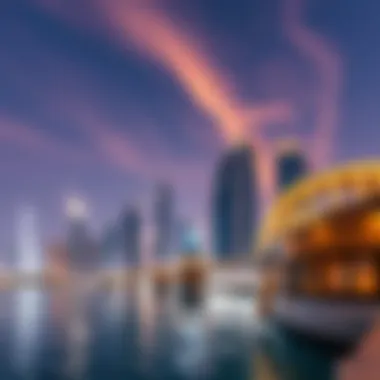

- Benefits of Private Tours:
- Tailored experiences to fit individual interests
- Increased opportunity for networking and connections
- Insights and stories that go beyond standard tourism
Private events can also range from luxurious weddings in breathtaking locations to curated art exhibitions showcasing the works of local and international artists. Indeed, the potential for luxury in the Middle East offers not just a trip but a grand narrative, stitched from experiences that linger long after the journey ends.
Real Estate Opportunities in Dubai
The topic of real estate opportunities in Dubai holds substantial weight in the conversation about Arabian escapes. Dubai has transitioned from a modest trading port to a dazzling metropolis known for its sky-high structures and luxury lifestyle. This transformation has come with a robust real estate market that attracts both investors looking for lucrative prospects and homeowners seeking an opulent lifestyle.
In this section, we will explore various factors that make Dubai an attractive real estate destination. From the strategic location to the impressive architecture and diverse investment options, the emirate offers a myriad of possibilities for different types of buyers.
Emerging Markets
Emerging markets in Dubai present a landscape ripe with potential. The city is continually evolving, and sectors such as off-plan developments are becoming increasingly popular. Areas like Dubai South and Mohammed Bin Rashid City are gaining attention for their spacious layouts and future potential. Investors are finding these areas appealing, as they offer lower entry prices compared to the more established locations like Downtown Dubai or the Palm Jumeirah.
Moreover, sector-specific growth, particularly in tourism, technology, and sustainable initiatives, is making neighborhoods like Dubai Marina and Jumeirah Lakes Towers essential hotspots for real estate investment. These growth vectors not only enhance property values but also promise long-term returns.
Investment Strategies
For those looking to navigate the Dubai real estate market, selecting the right strategy is crucial. Here are a few approaches that have shown success:
- Diversification: Investors often look to diversify their portfolios by investing in various types of properties—from villas to apartments and commercial spaces—across different neighborhoods.
- Focus on Off-Plan Properties: Buying off-plan often comes with lower prices and higher potential for appreciation as the project is completed. However, it requires thorough due diligence on the developers.
- Leverage Local Expertise: Working with seasoned real estate agents familiar with Dubai’s market nuances can provide invaluable insights. They can help buyers filter through numerous listings, considering factors like zoning laws and local market trends.
Understanding the dynamics of foreign investment regulations is also essential, especially with recent reforms aimed at welcoming more international investors.
Market Trends and Analysis
Analyzing current market trends highlights several key points:
- Rental Yields: Dubai continues to offer some of the highest rental yields in the world, often ranging from 6% to 10%, depending on the area and type of property. This can be a significantly attractive factor for investors.
- Price Stabilization: After years of rapid growth, prices have begun to stabilize, presenting advantageous buying conditions, particularly for first-time investors.
- Sustainability: There is a noticeable shift towards eco-friendly and sustainable developments, with initiatives aimed at enhancing green spaces and reducing energy consumption. Projects like the Sustainable City set a precedent for future developments.
"Dubai has evolved remarkably, but it retains a unique charm that blends modernity with tradition. This balance is reflected in its real estate sector, where historical neighborhoods stand alongside futuristic skyscrapers."
In summary, Dubai's real estate landscape is intricately woven with opportunities that call for a tailored approach. By understanding emerging markets, employing smart investment strategies, and keeping an eye on market trends, stakeholders can navigate this vibrant scene effectively.
Cultural Experiences to Explore
Cultural experiences in the Middle East are a gem that can often go overlooked. They serve as a gateway to understanding the region's varied tapestries and feelings of identity. For those keen on investing or simply enjoying their stay, immersing oneself in local culture can deeply enrich the experience. By engaging with festivals, artistic expressions, and traditional customs, one can grasp the essence of a place that artfully balances age-old traditions with bustling modernity.
Festivals and Events
Festivals in the Middle East offer a vibrant glimpse into the heart of its cultures. Celebrations like the Dubai Shopping Festival highlight the region's extravagant lifestyle and retail environment. It's a bonanza of discounts and entertainment that attracts millions. Then there’s Eid al-Fitr, which marks the end of Ramadan, a time when family gatherings and shared meals come alive in joyous communal spirit. Attending these festivals is not just about witnessing the spectacle; it offers opportunities to connect with locals, understand their traditions, and even enjoy authentic cuisine, sparking a connection that can go beyond the surface.
Local events often feature music and dance, showcasing talents unique to the region. The Jerash Festival of Culture and Arts in Jordan, for instance, is a platform where various artistic expressions converge—ranging from poetry to theater. Attending such events can deepen appreciation of the local heritage and may even serve as a networking platform for investors looking to tap into emerging markets.
Artistic Expressions and Heritage
Artistic expressions in the Middle East are a rich blend of influences reflecting centuries of history and intercultural exchanges. From the intricate designs of traditional Arabesque art to contemporary installations seen in modern galleries, the local art scene is diverse. Take the time to explore the Ibn Battuta Mall in Dubai, decorated with imaginative architecture bringing stories to life.
Street art in cities like Beirut or Dubai has gained traction and often conveys social messages, providing insights into current issues or community voices. Engaging with local artists through workshops or exhibitions not only supports the arts but builds invaluable connections with the community. Whether you're an investor, a homeowner, or a curious traveler, understanding these artistic expressions can enhance your overall appreciation of the region.
Local Customs and Traditions
Diving into local customs and traditions reveals a wealth of historical perspectives. Understanding the significance of gestures, such as greeting with a handshake or the more intimate cheek-kissing among close friends, can navigate daily interactions seamlessly. Observing Ramadan's fasting rituals, for example, speaks volumes about hospitality and generosity within communities.
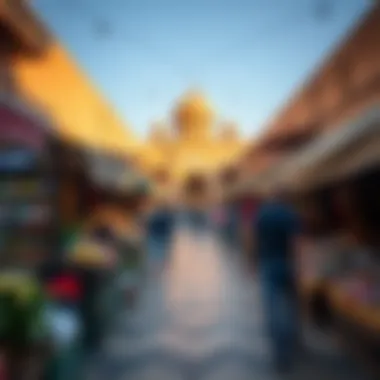

Moreover, local culinary practices reflect deep cultural roots. Traditional dishes like Mansaf or Kibbeh don’t just satiate hunger but tell stories of family lineage and regional pride. Participating in communal meals or home-cooked experiences can create meaningful memories that persist long after leaving.
In sum, exploring these cultural elements presents a unique chance to not only witness but engage in the authenticity of life in the Middle East. It encapsulates the juxtaposition of modern influences within an established heritage. Thus, if you’re eager to venture into the Middle East, heed these cultural pathways— they may well be the breadcrumbs leading to deeper understanding and valuable connections.
"To know the culture is to feel the soul of the place."
For further exploration of Middle Eastern cultural events and traditions, resources like Britannica.com and Wikipedia.org provide extensive academic insights beyond personal narratives.
Challenges and Misconceptions
In the context of Arabian escapes, challenges and misconceptions play a significant role in shaping perceptions and experiences. Understanding these issues is essential for potential travelers, investors, and stakeholders in the region. It empowers informed decisions and cultivates a more nuanced view of what the Middle East encompasses. Not only do these elements affect travel choices, but they also influence investment strategies and cultural exchanges.
Navigating Social Norms
Every region has its social standards, and understanding the intricacies of social norms in the Middle East is crucial. Travelers might find certain customs surprising or restrictive. For instance, dress codes differ from Western standards, especially in religious sites where modest attire is expected. Furthermore, interactions between genders may follow cultural norms that seem unfamiliar. A simple gesture, like a handshake, might not always be appropriate. Being aware and respectful of these social expectations can significantly enhance the experience.
- Dress Modestly: When visiting mosques or traditional neighborhoods, wearing long sleeves and skirts or trousers can show respect.
- Understand Interaction Boundaries: Knowing when to engage or maintain distance can prevent discomfort and foster goodwill.
- Learn Basic Local Phrases: A simple "hello" in Arabic goes a long way and demonstrates respect.
Addressing Stereotypes
Stereotypes regarding the Middle East often stem from media portrayals that fail to capture the region's diverse realities. A common misconception is that the area is homogenous in terms of culture, customs, and perspectives. This viewpoint neglects the rich variety found within countries and communities. For instance, cities like Dubai and Riyadh showcase modernity and progressive ideologies, whereas other areas may hold traditional values deeply. Challenging these stereotypes is vital for fostering understanding and companionship between visitors and residents.
- Breaking Down Misconceptions: It's important to portray the Middle East as it is – a mosaic of cultures, histories, and lifestyles, rather than a monolith governed by a single narrative.
- Promoting Cultural Exchange: Engaging in local events or culinary experiences can help dismantle preconceived notions and offer an authentic understanding.
- Encouraging Open Dialogues: Understanding the stories of local people can shift perspectives and create a more informed narrative about the region.
Safety and Security Concerns
A common apprehension for many considering Arabian escapes revolves around safety and security. Various media reports and historical context often conjure images of unrest. However, urban areas such as Abu Dhabi and Doha rank among the safest cities in the world. Understanding the context behind these narratives is crucial. While it's wise to stay informed about geopolitical situations, travelers and investors should recognize that many areas are thriving with development and opportunities.
When planning a visit or investment:
- Review Government Advisories: Websites like travel.state.gov provide updates on safety in specific regions.
- Stay in Safe Areas: Many luxury accommodations and districts are designed with security in mind, providing peace of mind.
- Observe Local Regulations: Following local laws and customs not only enhances safety but also respects the host culture.
Overall, confronting challenges and misconceptions opens the door to a more authentic experience of the Middle East. Embracing cultural differences enriches the journey and broadens perspectives.
This understanding significantly impacts how investors, homeowners, and agents interact with the region. A well-rounded approach leads to sustainable relationships built on mutual respect.
Future Trends in Arabian Escapes
The landscape of travel and investment in the Middle East is shifting rapidly, influencing how we perceive and engage with this diverse region. Understanding future trends in Arabian escapes is crucial for anyone involved in travel, real estate, or cultural exchange. By examining these trends, investors, homeowners and analysts can better position themselves to reap the benefits of these emerging opportunities.
Sustainability Initiatives
As environmental awareness grows, sustainability initiatives have become paramount in shaping travel experiences across the Middle East. Governments and private entities are increasingly recognizing their role in preserving the delicate ecosystems that attract millions of visitors each year. Tourism operators are shifting towards eco-friendly practices, promoting responsible tourism that reduces the carbon footprint.
For instance, the United Arab Emirates has made substantial investments in renewable energy projects, such as Masdar City in Abu Dhabi, which champions sustainable living. Travelers can now participate in eco-tours that not only showcase the breathtaking desert landscapes but also educate them about conservation efforts. This trend not only appeals to eco-conscious tourists but also enhances the region's global reputation, encouraging a more sustainable mode of travel.
"Sustainable tourism is not just a buzzword; it’s a commitment to future generations."
Technological Innovations in Travel
The travel sector is also seeing rapid advancements due to technological innovations. From smart hotels equipped with AI-controlled environments to mobile apps that tailor personalized itineraries, technology is enhancing the ease and enjoyment of Arabian escapes. For investors and homeowners, incorporating technological solutions into properties can significantly increase their appeal.
Airlines, for example, are utilizing artificial intelligence to optimize flight schedules while enhancing passenger experiences. Additionally, the rise of virtual reality in travel allows potential tourists to explore destinations before booking, providing a glimpse into what they can expect. This trend could potentially alter the traditional travel planning process as travelers gain confidence in their choices.
Evolving Real Estate Market Dynamics
Real estate in the Middle East is experiencing noteworthy shifts as preferences change among buyers. The evolving real estate market dynamics reflect broader societal trends, including a growing demand for smart facilities and community-centric developments. Investors are leaning towards properties that offer integrated lifestyles, emphasizing amenities like remote-work spaces and wellness centers.
Cities like Dubai are releasing innovative projects that cater to the younger generation’s desire for a balanced living experience. The recent popularity of off-plan sales indicates a strong confidence in the market’s future. Furthermore, international partnerships are facilitating cross-border investments, signaling a more global approach to real estate development.
To summarize, the future of Arabian escapes is filled with promise and potential, uniquely positioned at the intersection of tradition and modernity. Whether through sustainable practices, technological advancements, or transforming real estate trends, the region is gearing up to redefine itself in the global market. By staying informed and adaptable, those involved in Arabian escapes can not only benefit but also contribute to a nurturing travel and investment landscape.


